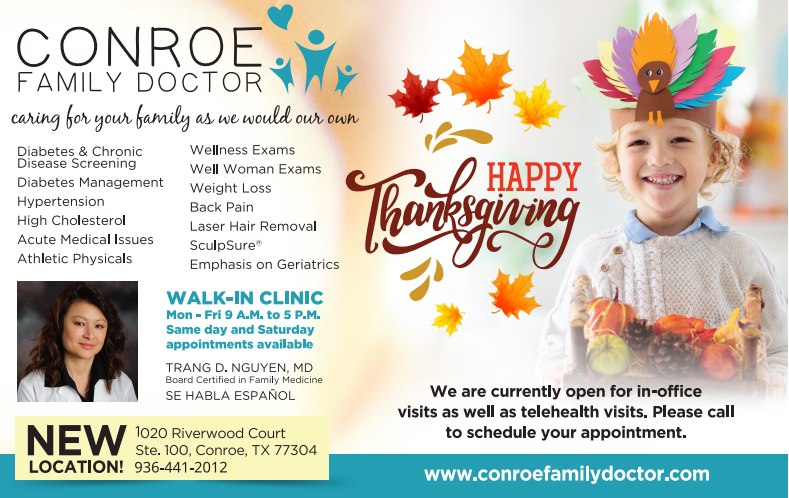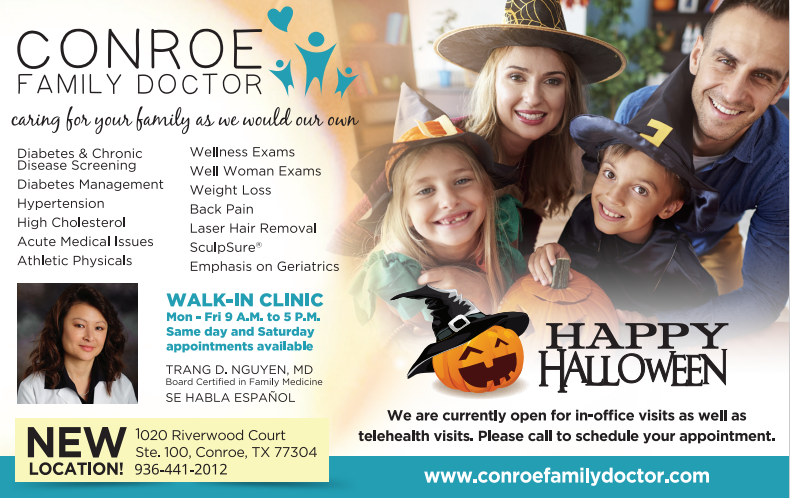
The New Year is coming, and it’s an exciting opportunity to try a fresh beginning in some things. It brings along a feeling of renewal, like the old mistakes can be washed away and a bright new future lies ahead. You want to meet that future in good health, so why not start an important new tradition and get your annual check-up scheduled now? With a clear view of your current health, your doctor will be able to help you make a plan for making it your best health year ever.
Discover The Importance Of An Annual Check-Up
While getting your health is taken care of is squarely on your shoulders, you can’t do it alone. A yearly physical ensures that your physician is able to serve as an effective part of your team. At your check-up, they can order blood tests, do standard health screenings, and identify problems that need further investigation. This is their opportunity to identify health problems before they become serious. By beginning treatment immediately they can limit the impact they have on your quality of life.
Patients with hypertension, diabetes and other chronic conditions especially benefit from these check-ups. The conditions advance can be monitored, and new treatments used to try to limit the impact it will have on your life in the year to come. Other great opportunities that present themselves as part of this check-up include:
- Lowering your cholesterol
- Losing weight
- Managing your blood sugar
- Breaking vices such as smoking
Every year your health will continue to change, presenting new challenges as you get older. Your physician can help you prepare for these as part of the annual check-up. New recommendations will be made, and things to watch for to identify new problems that may be around the corner. You’ll also have an opportunity to:
- Update your vaccines
- Update your medical records
- Consider medication changes
- Identify other health risks
Yearly check-ups are simply an essential part of maintaining good overall health. They’ll only become more essential as you get older.
What To Expect At Your Check-Up
Each year your check-up will be more or less the same, with new things being added occasionally as the years go by. The purpose of a check-up is to monitor your changing health and prevent concerns before they become a problem. This will involve exams that test your mobility, your ability to answer questions, and your overall appearance. As part of this, your physician will check your heart rate, your respiration, and blood pressure.
The specifics of your next check-up will depend on your overall health and the results of past exams. To uncover what to expect at your next appointment, give your physician a call. You can schedule your next visit and discuss what you can look forward to as part of your exam. By making the call early you’ll be able to start your New Year with your eyes wide open as pertains to your health. Don’t wait, next year could be the one in which you take control of your health!
November 19, 2021
in Blog
Conroe Family Doctor in Conroe, Texas Wishing you and your family a Safe and Happy Thanksgiving! Stay Safe & Healthy from COVID-19 this Thanksgiving. We are open for in-office visits as well as telehealth visits. Please call (936) 441-2012 or go Online www.conroefamilydoctor.com to schedule your appointment.

Every year nearly 70% of all those who smoke report that they desire to kick the habit. Considering how bad this vice is for our health, it’s not surprising how high this number is. Quitting provides significant benefits for nearly every organ in your body. Your heart health, in particular. Nearly 33% of all heart disease-related deaths have their foundation in smoke exposure, both directly and from secondhand smoke. For this reason, many smokers are looking at vaping and wondering if it might be a first step to quitting.
Vaping And Its Effect On Smoking Cessation
There’s a growing movement of smokers attempting a change to vaping to help them on their way to quitting. This has prompted a growing number of studies into the health effects of vaping. The following tips have been shared by Michael Blaha, M.D, M.PH, who serves as the John Hopkins Ciccarone Center For the Prevention of Heart Disease director of clinical research.
- Vaping is safe(r) than smoking: Your lungs are meant to take in clean air and extract oxygen from it. Anything else entering your lungs isn’t good for them, including vapor. However, tobacco smoke is known to contain over 7,000 chemicals. In addition, there’s the heat of the vapor and the tar in the smoke. While vaping isn’t good for you, it’s definitely got fewer chemicals than tobacco smoke.
- Research Suggests Vaping Still Affects Your Heart and Lungs: If you’re using vaping juice that contains nicotine, then it continues to be addictive. As long as you’re inhaling nicotine, you’ll be craving smoke and undergo the same withdrawal symptoms if this craving is ignored. If you’re using nicotine-free vape juice, however, you’ll avoid this risk and have a better chance of quitting smoking with vaping.
- Nicotine Bearing E-Cigarettes Are Just As Addictive: It’s important enough to bear mentioning twice. Studies indicate that nicotine can be as hard a habit to break as cocaine and heroin. Higher-strength cartridges of vape juice may actually contain more nicotine than cigarettes. Adjusting the voltage upward will also result in more nicotine occurring in each pull. If you’re trying to vape to quit smoking, use low to no-nicotine vape juice.
- E-Cigarettes Work For Some, But Aren’t The Best Option: While E-Cigarettes are often marketed as a way to quit smoking, this statement hasn’t been validated by the FDA. Studies suggest that those who take vaping up as a way to quit smoking often end up using both.
- Vaping Is Addicting A New Generation: A poor understanding of the health consequences of vaping over smoking has led to more youth picking up vaping. This new generation may have never touched traditional tobacco. Despite this, there’s a rising tide of youth that are taking up vaping.
It’s important to recall that, in most cases, vaping has fewer health consequences than smoking traditional tobacco. However, what remains unchanged is that it is not as healthy as not taking up either vaping or smoking.
Speak To Your Medical Provider For Smoking Cessation Tips
If you’re looking for ways to quit smoking, speak to your medical provider. The majority of medical clinics provide numerous smoking cessation options. Call yours and speak to them about what options are available.
Conroe Family Doctor in Conroe, Texas Wishing you and your family a Safe and Happy Halloween! Stay Safe & Healthy from COVID-19 this Halloween. We are open for in-office visits as well as telehealth visits. Please call (936) 441-2012 or go Online www.conroefamilydoctor.com to schedule your appointment.

If there is one term that can strike fear into the hearts of men, it’s impotence. Erectile dysfunction has been a concern that men have faced all time. This condition can have an impact on several areas that affect our quality of life. In addition to the inability to get or maintain an erection, men with ED face other struggles. These can include having their perception of their own masculinity impaired and social consequences. ED is fairly common among aging men but can occur at any age. Thankfully, there are numerous of ways in which this condition can be successfully treated.
Treatment Of Erectile Dysfunction With Medication
The most common course of treatment for erectile dysfunction is so well known it’s become part of pop culture. References to the ‘little blue pill’ have become common and are often used to refer to any pharmaceutical treatment for this condition. There are four different medications that are commonly prescribed to manage symptoms resulting from erectile dysfunction:
- tadalafil (Cialis)
- sildenafil (Viagra)
- vardenafil (Levitra)
- avanafil (Stendra)
Each of these drugs addresses the symptom in a similar way. Nitric oxide affects the body by widening the blood vessels, known as vasodilation. This widening of the blood vessels results in boosted blood flow. While the effect is body-wide, it is particularly prominent in the penis. This increased blood flow to this area results in extended erections that are easier to achieve.
While these treatments are definitely effective, they do have some potential side effects:
- Headaches – This symptom is the most commonly reported. The headaches occur as a result of the elevated blood flow resulting from nitric oxide. All forms of ED medication can cause this symptom, so a change won’t necessarily help. Your doctor may have suggestions for managing them.
- Body aches and pains – ED medications are commonly reported to cause pains and muscle aches. In some cases, this is specifically focused in the lower back. Over-the-counter medication can often help these symptoms. If you experience symptoms like these, call your medical practitioner for help.
- Digestive system problems – Some patients experience digestive discomfort while taking ED medication. In most cases, these symptoms present as diarrhea and indigestion. Drinking additional water during the day can help avoid these symptoms.
- Dizziness – Some men experience dizziness in response to higher levels of nitric oxide. While mild, it can interfere with daily activities. In extreme and rare cases, men may experience fainting spells. Speak to your doctor if this happens.
- Vision Changes – Changes in vision, including blurriness, can occur as a result of taking ED medication. While these symptoms are typically temporary, avoid using this medication if you have experienced vision issues in the past—especially retinitis pigmentosa.
Speak To Your Doctor For Help Treating Erectile Dysfunction
When erectile dysfunction is affecting your life, it’s time for a call to your physician. Medical professionals can provide useful information about treatment options. While these medications are the most prominently used treatments for this condition, other options exist. Call and schedule a consultation to learn more.






